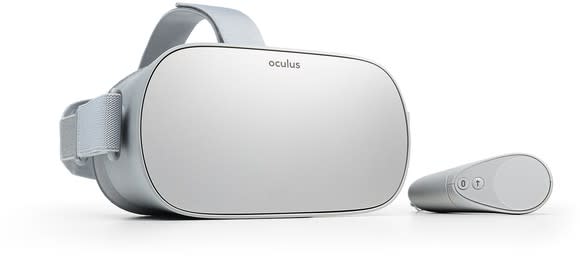Why Virtual Reality Sales Could Surge in 2018
Virtual reality technology hasn't been able to reach the mass market in the way many in the industry had hoped it would in the last two years. Facebook (NASDAQ: FB) didn't pay $2 billion for Oculus in order to sell a few hundred thousand VR headsets a year and reach only a small fraction of global consumers; it has its sights set on a billion headsets sold. HTC and Sony (NYSE: SNE), the two other industry leaders, are also hoping the market has a lot of growth ahead.
2018 could be a turning point for virtual reality as new technology hits the market. High-end products are getting better, and mass-market devices are on their way as well. Here's what to look for this year in VR.

HTC Vive Pro headset, which will be introduced in 2018. Image source: HTC.
Headsets are getting an upgrade
HTC announced the Vive Pro upgrade earlier this year, which includes a headset with better resolution, improved speakers, and better ergonomics. It's also getting a wireless adapter called Vive Tracker and new sensors called SteamVR 2.0 base stations. These will allow for 10-square-meter play areas when four base stations are combined.
Improving the high end of the VR market will help drive better content and a broader array of experiences at virtual reality arcades. Improving this side of the market will be key for driving the industry forward.
New products will open up a world of possibilities
If Mark Zuckerberg is going to hit his goal of getting VR into the hands of 1 billion people, it's going to take a wireless headset that won't break the bank. Oculus Go and the HTC Focus, which is only available in China right now, are the two leading the charge into the mass market. Oculus Go is set to debut this year for $200, while the HTC Focus has a higher price tag of $630 in China.

Image source: Oculus.
Getting a low-cost stand-alone headset into the hands of consumers will be a game changer for the VR industry because it'll increase the installed base dramatically. Right now, there are less than 5 million high-end VR headsets in the market, a small enough installed base that makes it difficult for content producers to make money. If HTC Focus and/or Oculus Go can reach tens of millions of consumers, it will drive better content and more investment in improving headset technology in the future.
2018 will be a critical year for VR
The new products coming to market this year have been years in the making, and they could chart the course for the virtual reality industry in the future. High-end headsets need to prove out the next generation of technology, pushing developers to create even more immersive content. And the mass market potential of VR will be tested when Oculus Go and potentially the HTC Focus hit the market. If all goes well, the VR market could grow tenfold in size very quickly.
More From The Motley Fool
Travis Hoium has no position in any of the stocks mentioned. The Motley Fool owns shares of and recommends Facebook. The Motley Fool has the following options: short March 2018 $200 calls on Facebook and long March 2018 $170 puts on Facebook. The Motley Fool has a disclosure policy.
